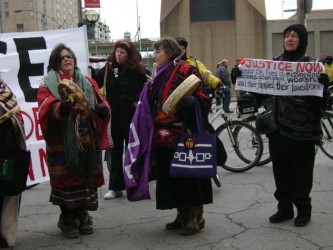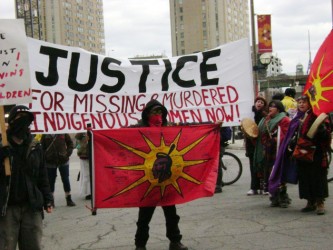Article Origin
Volume
Issue
Year
One of Toronto’s main transportation arteries was shut down on March 22 by activists seeking justice for missing and murdered Indigenous women (MMIW). About 35 people blocked Lakeshore Boulevard for 40 minutes.
The group had earlier been at a demonstration organized by poverty action groups at the Metro Toronto Convention Centre where the Ontario Liberal Party was holding its assembly. It was only when the rally ended that the MMIW supporters announced plans for further action.
Police on bikes scrambled to stop traffic as the group made its way down Lower Simcoe St. carrying warrior flags and a banner that read “Justice for Missing and Murdered Indigenous Women Now.”
Leading the march was John Fox of Wikwemikong Unceded Territory in northern Ontario. Fox’s 20-year-old daughter Cheyenne fell to her death from a 24-storey condominium in April 2013. The police ruled Cheyenne’s death a suicide, but Fox has said repeatedly he doesn’t accept that.
The police don’t care, he yelled into the bullhorn. The group, he said, wanted a national inquiry now. The crowd chanted “no more stolen sisters” amidst honking horns from angry motorists.
The group first made its way west along Lakeshore and there were tense moments between Fox and the police who attempted to dissuade Fox from continuing the march. Angry words were exchanged between several demonstrators and the police.
The group turned around to march east, stopping at the intersection of Lakeshore and Lower Simcoe where the women drummed and sang. Motorists leaned out their windows to see what was causing the delay, as police diverted traffic.
Long-time activist Jay Mason took the lead, continuing the march east along Lakeshore. As they reached the next intersection, police were prepared and blocked Lakeshore with their bikes preventing further movement both east and south.
“Okay, you’ve made your point,” one of the officers said. They threatened arrests if people remained in the intersection. Mason shouted at one of the officers who physically restrained him from moving south past the bicycle barricade.
They were standing their ground for missing and murdered women, said one of the protesters to police, urging people along. Undaunted by the threat of arrest, the women sang a song in honour of missing and murdered women. After the song, the march continued north along Rees Street. At the top of Rees, Davyn Calfchild took the bullhorn and spoke to the onlookers about the estimated 800 missing and murdered Aboriginal women, mothers, sisters, daughters, aunties and grandmothers.
“Sometimes you have to take drastic action,” said John Fox as people dispersed.
- 9833 views


